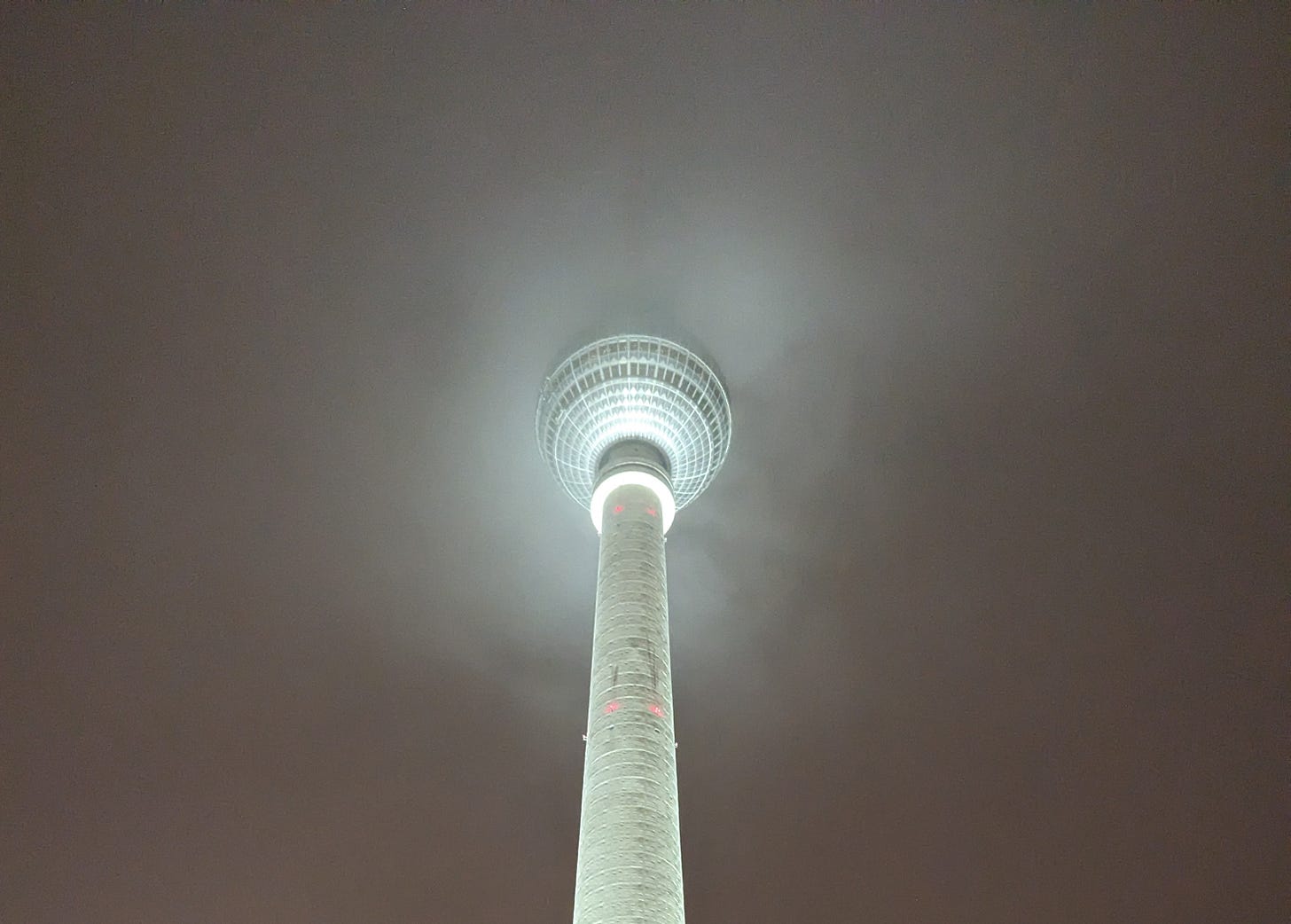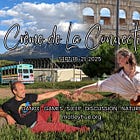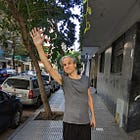Saturday Night, Berlin, 3:52am
why I dance
I am trapped, frozen, a prisoner of his gaze—this British man in a slim sequin dress.
Motionlessly I wait and watch as an electric wave runs down his body, neck to shoulders to chest to hips to legs to feet, muscles and sinews flowing and pulsing in orchestrated majesty, joints hinging in perfect isolation, every fraction of a second revealing years of discipline.
Then the music shifts, a phrase ends, a beat hangs in suspension—and I am released from his force field, liberated to begin my own undulations. Now he is in honey. Now he is in peanut butter. Now he is in ice. His movement stills, and his energy flows through our connected hands into my arms, ribs, belly, and spine. His wave becomes my wave. Without a conscious thought, I tilt my hips, shift my weight, sweep my free leg backward, and invite him to enter the space that I considered, just a moment ago, to be my own.
I once believed that I control my body. I now know that the British man controls my body. The song controls my body. The DJ controls my body. My tango teachers of a decade ago—Alicia and Rob and Alejandro—control my body. My fusion teachers of recent years—Flouer and Mark and Alain—control my body. The last twelve people with whom I danced control my body.
This body is, in fact, not mine. It is a living, pulsing, shivering archive of the beating hearts that have pressed against it, the fingers that have grazed it, the salty oils that merged with it, and the smiles cast upon it. This body is a temporary machine assembled from rock and dirt and ocean—and before long, it will return to those places. But now, for this moment, this night, this weekend, it is a machine that feels, sweats, dreams, and dances—and one that I lovingly, if mistakenly, call my own.
The song ends, and I open my eyes. The British man stares into them. I blink twice, return his gaze, widen my grin, and nod in quiet appreciation. He smiles wider and returns my nod. Then slowly, delicately, in unison, we release the tension in our hands, arms, shoulders, diaphragms, and intercostal muscles. The heat generated by our three minutes of mirrored motion, our silent kinetic fury, our crystallized human connection, dissipates into this private dance venue in Berlin, into the air that a hundred other dancers will soon breathe, just as I breathe the exhaled products of their struggles, victories, releases, and realizations. In these few seconds between songs, I sense the presence of so many others on the floor, each couple returning to earth from their own quiet reveries, their own fugue states, their own difficult conversations, their own tiny love affairs.
Now it is time to choose. Now I see her, and him, and her, and them—and I want to dance with all of them, four dances each, minimum. Yet I will not, I cannot, do this. For this world of partner dance is but a microcosm of the greater world. For time is short, opportunities are many, every decision is a rejection, and fate is less “chosen” than stumbled upon by pure, dumb luck—like whoever happens to be standing and smiling nearby when the British man and I part ways.
I try to accept this. I try to graciously embrace the unexpected invitations and unexpected rejections, the dances not danced with a particular person I know to be particularly perfect for a particular song, and the lonely moments on the side of the floor. I try to let my frontal lobe rest, to release my need for control, to pour every ounce of goodwill and creativity and presence into every dance, no matter who stands in front of me. I frequently do not succeed.
But the moments of desperation are rarer now than before, than the nights and weekends of knowing no one, of being a baby leader and a non-follower, of mostly sitting and watching these aliens who landed on earth, these beautiful tentacled smiling spinning creatures who hear tones I cannot hear and predict moments I cannot predict and move their limbs in ways I cannot move, who seem to know everyone and never get lonely and never lose energy, this strange species I have now apparently joined. Yet now I know to an absolute certainty that they are mortal, that they sweat and cry and doubt and suffer, that they have not resolved a single problem of the human condition beyond, perhaps, committing to the fact that movement is fundamental to life, that we must constantly embrace, that no single song or partner will complete us, and that sticking around a promising scene filled with good people, accepting the pain and awkwardness, showing up again and again and again is the only way that we ever transcend ourselves, the only way we “connect,” and the only way we become the aliens we always knew ourselves to be.
It is late. I am not built for this hour. But partner dance is the only thing—the only thing—that can keep me up till sunrise, until I escort myself home under brightening sky along the River Spree, fingers grazing the Berlin Wall, body shuddering with echoes of the night’s profoundest partnerships, heart clutching an impossible bouquet of riotously colored flowers, all the way until I turn the key, take the elevator, brush the teeth, flop onto the mattress in my friend’s guest room, don the earplugs and sleeping mask, exhale deeply, and rest for four or five hours, ready to do it all again the next night.
Written during Fusionauts 2025. Audio version below.
Related writing:






Wow Blake! This is a really powerful essay. Thank you for sharing it! I love reading about your experience.
Unexpected tie in, but have you read The Autobiography of Malcolm X? Dance clubs were a huge part of his formation in his early days, and there's something in the way you've been synthesizing experiences from dance culture and dirtbag culture that reminds me of how those scenes fit in to his story. From a certain angle, I've always thought of that book as a travel narrative (he was shaped so much by travel experiences in the States and then abroad), but hadn't really made the tie in with the dance thing prior. There's something in here about Brian Eno's concept of 'scenius' being incarnated physically I think.